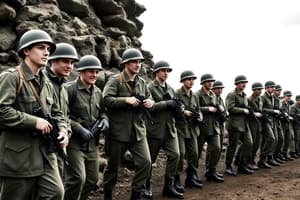Podcast
Questions and Answers
Který vůdce sehrál klíčovou roli ve vítězství Sovětského svazu ve druhé světové válce?
Který vůdce sehrál klíčovou roli ve vítězství Sovětského svazu ve druhé světové válce?
- Dwight D. Eisenhower
- Adolf Hitler
- Nikdo z výše uvedených
- Joseph Stalin (correct)
Kdo byl hlavním odpovědným za vývoj atomové bomby v rámci projektu Manhattan?
Kdo byl hlavním odpovědným za vývoj atomové bomby v rámci projektu Manhattan?
- Adolf Hitler
- Joseph Stalin
- Nikdo z výše uvedených (correct)
- Dwight D. Eisenhower
Který vůdce měl charakteristický styl centrálneho řízení státu a implementaci plánované ekonomiky?
Který vůdce měl charakteristický styl centrálneho řízení státu a implementaci plánované ekonomiky?
- Dwight D. Eisenhower
- Joseph Stalin (correct)
- Nikdo z výše uvedených
- Adolf Hitler
Kdo byl znám svým charizmatem a schopností shromáždit německý lid za svou vizi Velkého Německa?
Kdo byl znám svým charizmatem a schopností shromáždit německý lid za svou vizi Velkého Německa?
Který vůdce byl hlavním architektem operace D-Day během druhé světové války?
Který vůdce byl hlavním architektem operace D-Day během druhé světové války?
Který vůdce byl prezidentem Spojených států amerických mezi lety 1953 a 1961?
Který vůdce byl prezidentem Spojených států amerických mezi lety 1953 a 1961?
Kdo sloužil jako britský premiér během druhé světové války?
Kdo sloužil jako britský premiér během druhé světové války?
Kdo byl prezidentem Spojených států od roku 1933 do roku 1945?
Kdo byl prezidentem Spojených států od roku 1933 do roku 1945?
Jaký byl Winston Churchill jako vůdce?
Jaký byl Winston Churchill jako vůdce?
Jaký byl Franklin D.Roosevelt jako vůdce?
Jaký byl Franklin D.Roosevelt jako vůdce?
Kdo sehrál klíčovou roli při vypracování plánu invaze D-Den během druhé světové války?
Kdo sehrál klíčovou roli při vypracování plánu invaze D-Den během druhé světové války?
S kým spolupracoval Franklin D.Roosevelt na vytvoření Organizace spojených národů?
S kým spolupracoval Franklin D.Roosevelt na vytvoření Organizace spojených národů?
Study Notes
World War II: The Leaders
From the invasion of Poland in 1939 to the establishment of the United Nations in 1945, World War II was a defining period in human history. This global conflict saw the rise and fall of several influential leaders who shaped the course of the war and its aftermath. In this article, we will explore the key figures of World War II, focusing on their leadership styles, strategies, and impact on the war's outcome.
Winston Churchill
Born on November 30, 1874, Winston Churchill served as the British Prime Minister from 1940 to 1945 during World War II. Churchill was a charismatic leader who inspired the British people with his eloquent speeches and unwavering determination. He was instrumental in rallying the United States to join the war, as he believed in the importance of a united front against Nazi Germany. Churchill's strategic acumen played a crucial role in the Allied victory, as he played a key role in developing the D-Day invasion plan and coordinating the efforts of the Allied forces.
Franklin D. Roosevelt
Franklin D. Roosevelt served as the President of the United States from 1933 until his death in 1945. He guided the country through the Great Depression and led the nation into World War II. Roosevelt was a diplomatic leader who worked closely with other world powers to form the United Nations and establish a global peacekeeping organization. He also oversaw the development of the Manhattan Project, which led to the creation of the atomic bomb, a key factor in the eventual defeat of Japan.
Adolf Hitler
Adolf Hitler was the leader of Nazi Germany from 1934 until his death in 1945. Hitler's aggressive expansionist policies and militaristic ideology led to the outbreak of World War II. He was a charismatic speaker and was able to rally the German people behind his vision of a Greater Germany. However, his leadership ultimately led to the devastation of Europe and the deaths of millions of people.
Joseph Stalin
Joseph Stalin served as the leader of the Soviet Union from 1922 until his death in 1953. Stalin played a significant role in the Soviet Union's victory in World War II. He was a ruthless leader who was willing to take drastic measures to achieve victory. His leadership style was characterized by a centralized control of the state and the implementation of a command economy.
Dwight D. Eisenhower
Dwight D. Eisenhower served as the Supreme Allied Commander in Europe during World War II and later became the President of the United States from 1953 to 1961. Eisenhower was a strategic leader who oversaw the planning and execution of the D-Day invasion. He was also instrumental in the establishment of the North Atlantic Treaty Organization (NATO) to deter Soviet aggression and maintain peace in Europe.
These leaders played a crucial role in shaping the course of World War II and its aftermath. Their leadership styles, strategies, and decisions had a profound impact on the outcome of the war and the post-war world. While their legacies are complex and often controversial, their influence on world history is undeniable.
Studying That Suits You
Use AI to generate personalized quizzes and flashcards to suit your learning preferences.
Description
Explore the influential leaders of World War II, such as Winston Churchill, Franklin D. Roosevelt, Adolf Hitler, Joseph Stalin, and Dwight D. Eisenhower. Learn about their leadership styles, strategies, and the significant impact they had on the outcome of the war and the post-war world.





